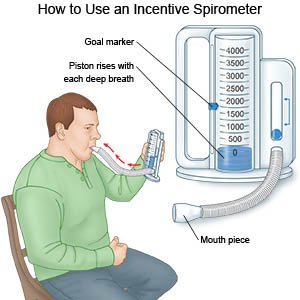Respiratory Care
Medically reviewed by Drugs.com. Last updated on Apr 6, 2025.
What do I need to know about respiratory care?
Respiratory care includes exercises and treatments to help you breathe better and keep your lungs healthy. Respiratory care helps prevent infections, such as pneumonia.
 |
Which exercises and treatments might I need?
Your healthcare provider will tell you how often you need the following:
- Breathing treatments help open your airways so you can breathe easier. A machine is used to change liquid medicine into a mist. You will breathe the mist into your lungs through a tube and mouthpiece.
- Postural drainage (PD) helps loosen the mucus in your lungs. You will sit or lie down in several different positions to help gravity bring up the mucus.
- Chest physiotherapy (CPT) also helps loosen mucus and may be done at the same time as PD. During CPT, a healthcare provider may lightly clap on your back and chest with his or her hands. He or she may use a device, such as a vest, to create vibration. CPT brings up the mucus from your lungs and makes it easier to cough it up.
- Quad assist coughing helps you cough up mucus if your muscles do not work correctly. A healthcare provider will place his or her hands on your abdomen between your ribs and belly button. The provider will thrust his or her hands upward at the same time that you cough.
- Suctioning may be needed if other treatments do not work. Ask your healthcare provider for more information about suctioning.
What do I need to know about deep breathing exercises to keep my lungs healthy?
Deep breathing exercises help open your airway and decrease your risk for a lung infection. You will need to take deep breaths and then cough. First, take a deep breath and hold it for as long as you can. Then let the air out and cough strongly. You may be given an incentive spirometer to help you take deep breaths. Put the plastic piece in your mouth and take a slow, deep breath. Then let the air out and cough. Repeat these steps 10 times. Do deep breathing exercises at least 4 times each day.
 |
Call your local emergency number (911 in the US) if:
- You feel lightheaded, short of breath, and have chest pain.
When should I call my doctor?
- You have a fever.
- You cough up green or yellow mucus.
- You cough up blood.
- You have questions or concerns about your condition or care.
Care Agreement
You have the right to help plan your care. Learn about your health condition and how it may be treated. Discuss treatment options with your healthcare providers to decide what care you want to receive. You always have the right to refuse treatment. The above information is an educational aid only. It is not intended as medical advice for individual conditions or treatments. Talk to your doctor, nurse or pharmacist before following any medical regimen to see if it is safe and effective for you.© Copyright Merative 2025 Information is for End User's use only and may not be sold, redistributed or otherwise used for commercial purposes.
Further information
Always consult your healthcare provider to ensure the information displayed on this page applies to your personal circumstances.
